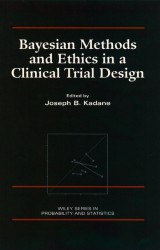Details

Bayesian Methods and Ethics in a Clinical Trial Design
Wiley Series in Probability and Statistics, Band 771 1. Aufl.
|
171,99 € |
|
| Verlag: | Wiley |
| Format: | |
| Veröffentl.: | 20.09.2011 |
| ISBN/EAN: | 9781118150597 |
| Sprache: | englisch |
| Anzahl Seiten: | 344 |
DRM-geschütztes eBook, Sie benötigen z.B. Adobe Digital Editions und eine Adobe ID zum Lesen.
Beschreibungen
How to conduct clinical trials in an ethical and scientificallyresponsible manner<br> <br> This book presents a methodology for clinical trials that producesimproved health outcomes for patients while obtaining sound andunambiguous scientific data. It centers around a real-world testcase--involving a treatment for hypertension after open heartsurgery--and explains how to use Bayesian methods to accommodateboth ethical and scientific imperatives.<br> <br> The book grew out of the direct involvement in the project by adiverse group of experts in medicine, statistics, philosophy, andthe law. Not only do they contribute essays on the scientific,technological, legal, and ethical aspects of clinical trials, butthey also critique and debate each other's opinions, creating aninteresting, personalized text.<br> <br> Bayesian Methods and Ethics in a Clinical Trial Design<br> * Answers commonly raised questions about Bayesian methods<br> * Describes the advantages and disadvantages of this methodcompared with other methods<br> * Applies current ethical theory to a particular class of designfor clinical trials<br> * Discusses issues of informed consent and how to serve a patient'sbest interest while still obtaining uncontaminated scientific data<br> * Shows how to use Bayesian probabilistic methods to createcomputer models from elicited prior opinions of medical experts onthe best treatment for a type of patient<br> * Contains several chapters on the process, results, andcomputational aspects of the test case in question<br> * Explores American law and the legal ramifications of using humansubjects<br> <br> For statisticians and biostatisticians, and for anyone involvedwith medicine and public health, this book provides both apractical guide and a unique perspective on the connection betweentechnological developments, human factors, and some of the largerethical issues of our times.
Partial table of contents:<br> <br> MAJOR ISSUES.<br> <br> Ethically Optimizing Clinical Trials (K. Schaffner).<br> <br> Admissibility of Treatment (N. Sedransk).<br> <br> TEST CASE: VERAPAMIL/NITROPRUSSIDE.<br> <br> The Mechanics of Conducting a Clinical Trial (E. Heitmiller &T. Blanck).<br> <br> Issues of Statistical Design (N. Sedransk).<br> <br> Operational History and Procedural Feasibility (J. Kadane).<br> <br> Verapamil versus Nitroprusside: Results of the Clinical Trial I (J.Kadane & N. Sedransk).<br> <br> Verapamil versus Nitroprusside: Results of the Clinical Trial II(E. Heitmiller, et al.).<br> <br> OTHER ISSUES.<br> <br> Author's Response to Commentaries I and II (D. Kairys).<br> <br> EPILOGUE.<br> <br> Epilogue (J. Kadane).<br> <br> Indexes.
"...Every practitioner and associated statistician involved in a clinical trial should read this book..." (Statistical Methods in Medical Research, No.11, 2002)
JOSEPH B. KADANE is Leonard J. Savage Professor of Statistics and Social Sciences at Carnegie Mellon University. He has published over one hundred papers on statistical theory and applications, edited the book Robustness of Bayesian Analysis, and coedited Statistics and the Law.
How to conduct clinical trials in an ethical and scientifically responsible manner <p>This book presents a methodology for clinical trials that produces improved health outcomes for patients while obtaining sound and unambiguous scientific data. It centers around a real-world test case—involving a treatment for hypertension after open heart surgery—and explains how to use Bayesian methods to accommodate both ethical and scientific imperatives.</p> <p>The book grew out of the direct involvement in the project by a diverse group of experts in medicine, statistics, philosophy, and the law. Not only do they contribute essays on the scientific, technological, legal, and ethical aspects of clinical trials, but they also critique and debate each other's opinions, creating an interesting, personalized text.</p> <p>Bayesian Methods and Ethics in a Clinical Trial Design</p> <ul> <li>Answers commonly raised questions about Bayesian methods</li> <li>Describes the advantages and disadvantages of this method compared with other methods</li> <li>Applies current ethical theory to a particular class of design for clinical trials</li> <li>Discusses issues of informed consent and how to serve a patient's best interest while still obtaining uncontaminated scientific data</li> <li>Shows how to use Bayesian probabilistic methods to create computer models from elicited prior opinions of medical experts on the best treatment for a type of patient</li> <li>Contains several chapters on the process, results, and computational aspects of the test case in question</li> <li>Explores American law and the legal ramifications of using human subjects</li> </ul> <p>For statisticians and biostatisticians, and for anyone involved with medicine and public health, this book provides both a practical guide and a unique perspective on the connection between technological developments, human factors, and some of the larger ethical issues of our times.</p>
Diese Produkte könnten Sie auch interessieren:

Nonparametric Regression Methods for Longitudinal Data Analysis

von: Hulin Wu, Jin-Ting Zhang

135,99 €

Statistics and the Evaluation of Evidence for Forensic Scientists

von: Colin Aitken, Franco Taroni

103,99 €














